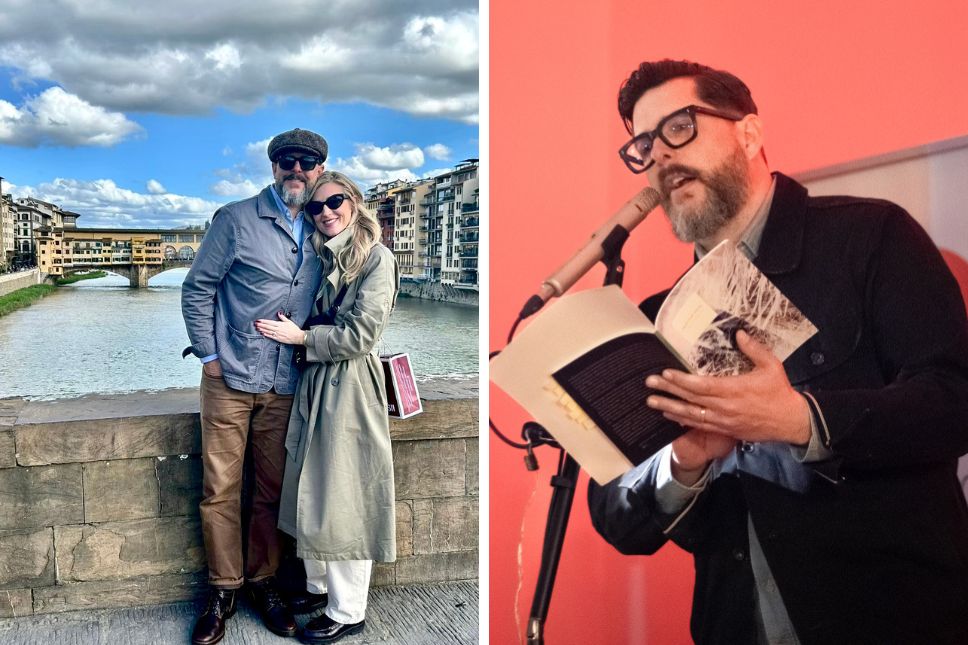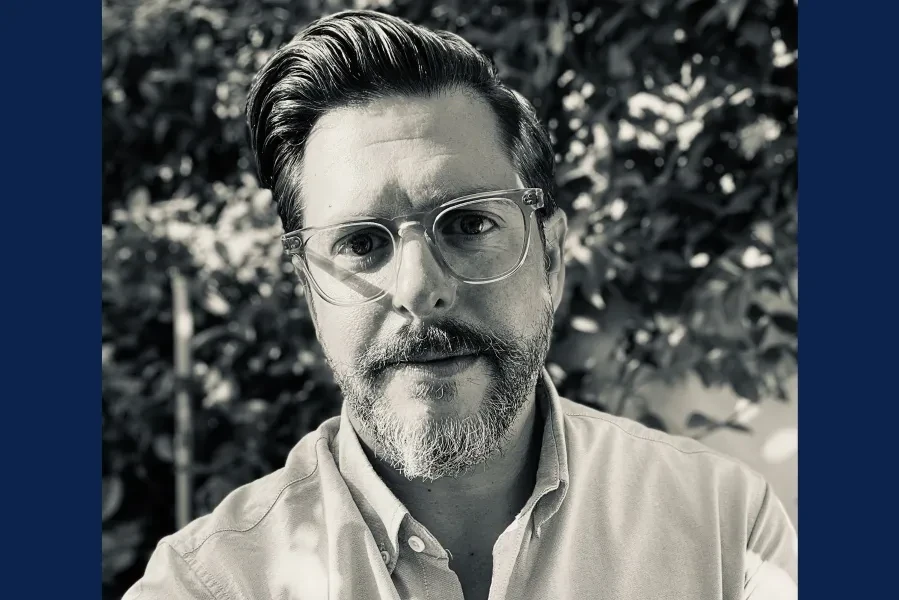The poetry book hit a young James Meetze square in the chest. He has a history of having books affectionately thrown at him, but this time, it was courtesy of his high school English teacher.
Dr. James Meetze, today a professor in the Communications Arts department, found himself pulled into the pages of that book. He was captivated by the thought-provoking verses, and they unveiled a path for his life.
“That book opened me up and changed my whole trajectory,” Dr. Meetze says. “I went home that day and said, ‘You know what, I’m going to be a poet, and I’m going to be a professor.’ What 14 or 15-year-old decides they want to do that?”
Scribbling constantly, Dr. Meetze wrote all through high school until he could finally enroll in community college and begin his educational path to poetry and professorship.
He was full of ambition.
“I immediately dropped out of community college after my first semester because I failed my English course,” Dr. Meetze admits. It’s a story he shares with his students regularly. “I failed my English course because I didn’t cite my sources.”
He worked at a ski resort for a winter to, as he says, get his head on straight so he could head back to school and start over. This time, fully prepared to thumb through the library’s card catalogs to cite his sources.
Words Traveling the World
Today, Dr. Meetze is a published author with five full-length poetry books and several chapbooks (small collections of poetry). He has also co-authored two textbooks and edited a posthumous collection of poems by Pulitzer Prize winner James Schuyler.
“I’m a writing fool,” Dr. Meetze quips.
One of his books, “Phantom Hour,” is about his father who had dementia for many years. Through lines of poetry, Dr. Meetze investigated dementia, family history, and what happens to our stories when memory fails.
He reclaimed his father’s memory with his passion and skill for stanzas, but Dr. Meetze’s parents were not initially as invigorated about this career path as he was. However, after his winter reset working at the ski resort, he enrolled at the University of California, Santa Cruz where he soon won the University of California Poet Laureate Award.
“It came at a crucial point,” says Dr. Meetze. “My parents always said, ‘You can’t major in poetry,’ but I won this award and said ‘Oh, by the way, I’ve won this award and been invited to Berkeley to a ceremony to give a reading. Would you like to come?’’’
From that point forward, his parents realized how serious his path and commitment were, and Dr. Meetze knew it was what he was meant to do.
 Left, Dr. James Meetze with his wife; right, Dr. James Meetze at a book reading.
Left, Dr. James Meetze with his wife; right, Dr. James Meetze at a book reading.
Berkeley was the beginning of many more book readings to come. His books have been translated into multiple languages, and he has been invited to give readings around the globe, including Finland, Turkey, Mexico, Slovenia, and Croatia. The latter hosts one of the oldest poetry festivals in Europe, and Dr. Meetze was invited to read as an international poet.
“What I most enjoyed was getting to meet other poets from all over the world. From Honduras, China, Germany, Bulgaria, Poland, Croatia, Italy, and the UK,” Dr. Meetze shares. “To meet people who are equally devoted to this vocation and see it from a different perspective – it’s beautiful, I love it.”
Intertwined Communities
Making connections has been one of the most fruitful outcomes as a writer for Dr. Meetze. There is often overlap between poets and educators, which has led to next steps, new opportunities, and friends-turned-colleagues. He first met Dr. Nate Pritts, a program chair in the College of Arts and Sciences, in the poetry world and now they work together at UAGC.
“Poetry has taught me the beauty of community, interpersonal networks, and the power of the written word,” says Dr. Meetze. “I call poetry my vocation and education my profession, but they’re never far away from one another.”
After earning his MFA from Mills College in Oakland, California, Dr. Meetze was ready to move straight into a PhD program, but the two professors he was going to work with left for other universities, so he bookmarked the goal for a later date.
In the meantime, he worked odd jobs for about a year until he got a phone call from one of those connections in the poetry community. A fellow poet was running the creative writing program at the University of California, San Diego, and thought Dr. Meetze would make a great teacher for one of their classes. And Dr. Meetze’s career as an educator was born.
He later taught at California State University, San Marcos, and online at National University before joining UAGC in 2011.
While at UAGC, he went back and earned his PhD while teaching full-time, another fact he enjoys sharing with students.
“I can tell them, ‘Hey, I also went to school while working full-time and raising a kid as a single dad,’” he says. “So, I have an appreciation for the circumstances many of my students are living.”
Becoming a life-long learner and teacher of Stories
In addition to writing poetry, Dr. Meetze has written a few screenplays, including producing five feature-length scripts and two TV pilots with one of his best friends.
“It’s something that I’ve really enjoyed doing,” he shares. “I like doing things that are kind of outside my normal thought process to keep the brain functioning. It’s very structured, and I’m kind of a big-picture person.”
He’s even won a handful of awards, including Best Thriller: Short at the Grand Budapest Film Festival for “The Conservationist,” which he co-wrote and executive produced.
“Focusing on specifics and structure challenges me to flex different muscles than I usually do, but then again, that same muscle that I would use in screenwriting informs my course design, which is also highly structured,” Dr. Meetze explains. “It follows a narrative arc. You have to get from the beginning to the end.”
It makes sense then that he teaches Introduction to Film as an English course, and the focus is on understanding narrative. His course teaches students to understand the various ways stories are told by analyzing cinematic techniques. They then apply critical thinking and use writing to articulate how the pieces they’ve identified collectively create meaning or a message.
“When taken all together, I think these skills are so integral to what a student does, no matter what their major is,” says Dr. Meetze. “It’s those basic skills of understanding narrative, stories, visual literacy, visual analysis, and critical thinking, and to tie those things together. Then improving your writing and seeing how these stories that we see in films are meaningful to us.”
Dr. Meetze’s real-world experiences as a published poet, screenwriter, producer, educator, and world traveler lend his classes and teaching to be rooted in practicality. Still, not every student grew up appreciating “The Goonies” and anxiously anticipating the latest Martin Scorsese masterpiece. While some of his students start out questioning what a film class will contribute to their studies, Dr. Meetze enjoys it when those students have a cinematic moment of their own.
“My favorite moment is seeing students have that epiphany in the middle of a course and change their trajectory because they fall in love with something — writing, literature, or film — and say, ‘I was another major, but now I’ve decided to focus on English, Literature, or Writing,’” he says excitedly. “They’ll write me and say they’ve finished an MFA program or a master’s degree in that field, and I get to write letters of recommendation for them and follow up with them over the years and see how they succeed and make careers out of something they’ve become passionate about in the classroom.”
Leaning into what you Love
Dr. Meetze found a passion for literature early in life. As a child, he had an overflowing eagerness to play the saxophone, so his mother made him a deal. He could learn to play the saxophone only if he spent an hour a day reading a book for the next two months. He picked up Michael Crichton’s sci-fi thriller “Sphere,” and the saxophone was long forgotten.
When Dr. Meetze was in college, his reading began to establish the roots of his literary lineage, which is also something he encourages his students to do.
“One thing I love to tell students is we can look to the books, films, whatever it is we’re studying and see who influenced the people that did the work we’re studying,” he shares. “We can find this lineage to which we belong as thinkers, writers, creatives, business people, educators, whatever it is we do.”
He shared his example of Allen Ginsberg whom he says was great at mentioning influences and peers in his poetry. In college, Dr. Meetze took those names and went to the library and bookstore to track down every book he could, which then shaped his thinking and writing.
That was before the internet, but now as a teacher in an online learning environment, Dr. Meetze appreciates and commends the accessibility and credibility of online education.
“I think the accessibility that online education provides to a broader range of non-traditional students is so meaningful,” he says. “I think the level of education they get is even more attuned to student outcomes, more attuned to their success. The ability to look at what works, look at the actual metrics we’re seeing and disambiguate them, and then use what we learn in how we update our courses and how we interact with students.”
Dr. Meetze discovered his path in life as a teenager and is as engaged with poetry and teaching as ever. Everyone has their own story, but we can relate to other's stories, and he encourages his students to lean into that while they find what they love.
“Stories have the power to change us, to see ourselves reflected in the stories of others makes us feel less alone, and I think that’s really important,” says Dr. Meetze. “Find what you’re passionate about and then find a way to make that what you do, because then it makes doing what you do much more rewarding and more enjoyable.”
--
Written by Felysha Walker
